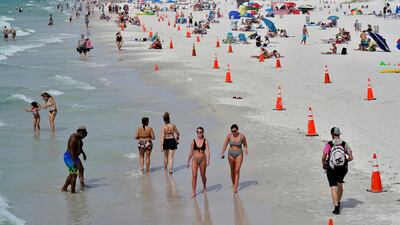It’s considered an American college student’s right of passage. A week of fun-filled days spent in the warm Florida sun.
A year ago, images of young people ignoring public health guidelines went viral, but eventually like so much of the world, spring break was interrupted by the coronavirus pandemic.
The students went home, the tourism and crowds mostly ceased.
This year, even though the virus remains a serious problem across the country, spring breakers have returned to the Sunshine State.
Andrew Cohen is the co-founder of Staying Afloat Party Boat, a rental company that caters to spring breakers. “It’s paradise here. Spring break is in full effect,” he said from Fort Lauderdale, a popular tourist destination.
Mr Cohen said business is not just booming – its the best it has ever been.
“Record breaking – everything is through the roof. We’re a relatively new company, three years-old, and we’ve been trying to grow pretty aggressively. So we’ve added boats and even scaled up boat for boat. It’s just through-the-roof sales,” he said.
South of Fort Lauderdale, in Miami, the tourists are back as well.
“It’s a typical spring break time; it's not any different than any other year,” said Traci Elizabeth Holstein.
Ms Holstein lives in Miami Beach, one of the most popular destinations for college students looking to enjoy their holiday.
Images from the weekend show large crowds gathered on the beaches and in the streets.
“I’m concerned for people’s health,” said Ms Holstein. “My main message is I just wish people would be patient and wait another year.”
She’s not alone.
Although Covid-19 cases in Florida are going down, the state is still experiencing about 4,000 new cases a week.
To date, more than 32,000 people have died in Florida from the virus, behind only New York, California and Texas.
“We’re doing better, but I don’t want to say we’re in a great situation where it’s time to relax because we’re really not there,” said Dr Cindy Prins, an associate professor of epidemiology at the University of Florida in Gainesville.
An influx of young people from across the country could not only set the state back but also the nation as it fights to get cases down and vaccinations up.
"There's a worry about people getting infected and bringing it back to where they live, to other states and then seeding it there," Dr Prins told The National.
With the UK variant already present in the state, Dr Prins is concerned spring breakers could bring even more variants into Florida.
“When you have a lot of people getting together and if there are one or two people that are already carrying those variants, that's a great way for those to be spread around further.”
Florida currently has no state-wide travel restrictions or mask requirements.
"We like the fact that people are able to work here. We like the fact that we have been able to save thousands, thousands of businesses and save people's livelihoods,” said Governor Ron DeSantis.
The state’s lack of strict restrictions has made some Floridians angry, especially with all the extra tourists flocking the area.
“Governor DeSantis has not made the smart decision for anybody and pretty much has put the onus on the population itself to make the decisions and people don’t make smart decisions," said Samantha Moore of Palmetto Bay, Florida.
“It’s tough. I wish there was somebody who was taking a strong stand for the people who live here and don’t have to increase our risk.”


